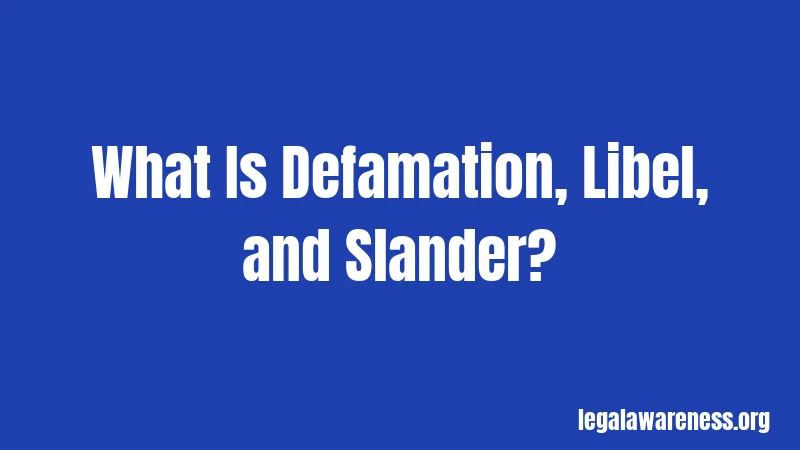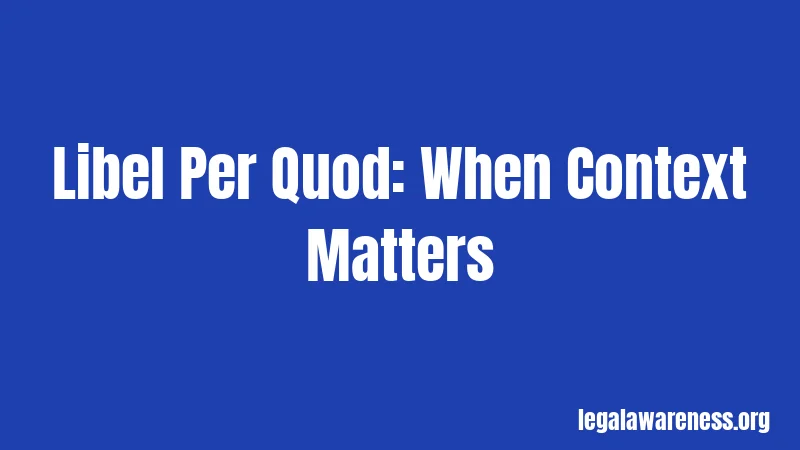Libel and Slander Laws in Texas (2026): Everything About False Statements
Most people have no idea how seriously Texas takes false statements about others. But here’s the thing: saying or writing lies about someone can actually get you sued. The penalties can get expensive fast. Let’s break down exactly what you need to know about libel and slander in Texas.
Whether you’re dealing with a rumor about yourself or worried you’ve said something that could get you in trouble, understanding these laws matters. This guide covers the basics, the penalties, and what happens when things go wrong.
What Is Defamation, Libel, and Slander?

Okay, let’s start simple. Defamation is the legal term for spreading false information that damages someone’s reputation. There are two types. Libel is the written version. Slander is the spoken version. It’s that easy to remember.
Here’s why it exists: the law wants to protect people’s reputations. But it also protects free speech. So Texas law tries to balance both. You can say things about people. You just can’t make up lies designed to hurt them.
The Difference Between Libel and Slander
Libel is any false statement made in written form. This includes emails, social media posts, text messages, websites, books, articles, and basically anything you can read. Written defamation is taken pretty seriously in Texas.
Slander is false statements made by speaking. This includes conversations, speeches, podcasts, phone calls, and radio broadcasts. Spoken lies about someone can also get you sued, but they’re treated differently under Texas law.
Think of it this way: libel is permanent because it’s written. Slander is temporary because it’s spoken. The law handles them differently because of that.
What Exactly Gets You in Trouble?

Here’s where it gets important. Not every false statement is defamation. There are specific rules that have to be met.
The statement has to be false. If what you said or wrote is actually true, that’s a complete defense. Truth is basically your get-out-of-jail-free card. The statement also has to be about a real, identifiable person. You can’t just make vague comments that people guess refer to someone.
The statement needs to be published or communicated to someone else. You can’t just think something mean about someone in your head. It has to reach at least one other person. Publishing doesn’t mean it has to be in a newspaper either. Posting on social media counts. Telling a friend counts. Even sending an email counts.
The statement has to actually harm the person’s reputation. Not just hurt their feelings. We’re talking about statements that make people think less of them or damage their business or career.
Libel Per Se: The Serious Stuff
Got a minute? This one matters. Some statements are considered so obviously damaging that you don’t even have to prove someone was hurt. They’re just assumed to be harmful. These are called “libel per se.”
What falls into this category? False statements accusing someone of a crime. Lies about someone having a serious disease. False claims about someone being bad at their job. Statements about someone’s sexual conduct. If your statement falls into one of these categories, Texas courts assume damage happened. You don’t have to prove it.
This is a big deal for people claiming defamation. It makes their case easier to win.
Libel Per Quod: When Context Matters

On the flip side, “libel per quod” means the statement isn’t obviously harmful on its surface. The damage comes from how people understand it in context.
Example? Imagine a newspaper announces someone won the lottery. Seems fine, right? But what if that person is a minister whose church opposes gambling? Suddenly, that announcement becomes damaging. The fact itself is true, but the context creates the harm.
In cases of libel per quod, you have to prove that the statement actually hurt your reputation. You can’t assume damage.
Slander Per Se: Spoken Lies That Really Hurt
Just like written defamation, spoken defamation also has categories. Slander per se includes the same harmful types of statements as libel per se. False accusations of crime. Lies about diseases. Professional incompetence. Sexual conduct.
With slander per se, you don’t have to prove damages. The law assumes they happened. This protects people from having to jump through hoops to prove harm when someone spreads damaging rumors about them.
Who Can You Sue? Public Figures vs. Private People
Here’s where things get more complicated. The standard of proof depends on who the false statement is about. Honestly, this is the part most people miss.
If you’re a private person, the person who lied about you only needs to be negligent. Negligent means they didn’t take reasonable care to check if something was true before saying it. That’s a pretty low bar to clear.
If you’re a public figure, the rules get tougher for you. A public figure includes celebrities, politicians, famous business people, and anyone who voluntarily put themselves in the public eye. You have to prove something called “actual malice.” This means the person either knew what they said was false, or they totally disregarded whether it was true or not. This is a much higher standard. It’s harder to win these cases.
Wait, it gets better. Even if you’re not technically famous, if you deliberately got involved in a public controversy, you might be considered a limited-purpose public figure for claims about that topic. A friend asked me about this last week. Most people get confused thinking they’re private when they’re actually not.
What Are the Penalties for Libel and Slander?
So what happens if you get sued for defamation? The main consequence is money. Lots of it.
The person who wins a defamation case can get compensatory damages. This covers actual harm to their reputation, career, or finances. If they lost income because of false statements, they can recover that. If they spent money on therapy or counseling to deal with emotional distress, those can be damages too.
But wait, there’s more. If a plaintiff proves you acted with actual malice (knowing it was false or recklessly not caring), they can get punitive damages. These are designed to punish you and discourage future bad behavior. Punitive damages can be big. Really big.
Here’s what makes this interesting: in Texas, even in extreme cases of libel per se, courts have ruled that only nominal damages (small amounts) can be presumed without proving actual harm. You still have to show real injury.
There’s also a criminal version, but it’s super narrow. Criminal slander or libel in Texas only applies to false statements about a financial institution’s condition. Regular defamation between people is civil, not criminal. Think of it like a traffic ticket (civil) versus a crime (criminal).
How Long Do You Have to Sue?
Wondering if there’s a time limit? There absolutely is. In Texas, you have exactly one year from when you discover the false statement to file a lawsuit. Not one year from when it was made. One year from when you found out about it.
This is really important. The clock doesn’t start until you actually learn (or should have reasonably learned) about the statement. So if someone posted something defamatory about you five years ago and you just found out, the one-year clock just started running. You better move fast.
Each statement counts separately too. If someone makes multiple false statements about you, you get one year for each one.
Common Defenses People Use
Let me break down the defenses someone might use if you sue them for defamation. These matter because they might win, and you need to know what you’re facing.
Truth is the strongest defense. If what they said is actually true, you lose. No matter how harmful it is, no matter how much it hurts. Truth is a complete defense. The defendant doesn’t have to prove truth in a perfect, literal sense either. They just have to show the statement is “substantially true.” That means the main point is accurate, even if some details are wrong.
Opinion is protected. If someone says “I think this product is terrible,” that’s an opinion. Opinions aren’t defamatory because they can’t really be proven true or false. But here’s the tricky part: if an opinion clearly implies false facts, it might lose protection. The context matters a lot.
Privilege protects some statements. Some things you say are legally protected even if they’re false. Statements made in court or during legislative proceedings are absolutely privileged. You can’t sue someone for what they said there. Government officials making statements in their official capacity also get protection. These privileges exist to encourage people to speak freely in these contexts.
Fair report privilege protects accurate reporting. News outlets can report on official proceedings without worrying about libel, as long as they report accurately. This applies to court cases, government meetings, and official records. As long as they report fair and true accounts, they’re protected.
Statements made with consent. If you agreed to something being published or shared, you generally can’t sue for defamation about it. Consent is a valid defense.
When Is This Actually Criminal?
Stay with me here. As I mentioned earlier, defamation is almost always a civil matter in Texas. That means you’re suing for money, not pressing criminal charges.
But there’s one exception. Texas Financial Code Section 119.202 makes it criminal to knowingly make false statements about the financial condition of a bank or savings institution. That’s it. Just banks. It’s a narrow rule, but it exists.
For regular defamation between people (the kind most people deal with), it’s civil only. That’s actually good news if you’re worried. Worst case, you pay money. You won’t go to jail.
Cease and Desist Letters: Taking Action
If someone’s spreading false information about you, what should you do? Don’t panic. There are steps you can take.
First, consider sending a cease and desist letter. This is basically a formal “stop it or I’ll sue you” message. It puts them on notice that you know about the false statements and that you’re serious about stopping them.
Important note: only do this on advice of a lawyer. Seriously. A poorly written letter can actually hurt your case. A good cease and desist letter from a lawyer shows you’re serious, and it sometimes scares people into stopping.
After sending the letter, the ball’s in their court. They might take down the statement. They might ignore you. If they keep going, that gives you grounds for a lawsuit.
Social Media and Online Defamation
This is where things get tricky in 2026. Social media makes defamation easier to spread and harder to control. One false statement can reach thousands of people instantly.
The rules are the same, but the stakes feel higher. A post on X (formerly Twitter) is published. A comment on Facebook counts as publication. A TikTok video spreading rumors is defamation if the statements are false and harmful.
Honestly, this is where most defamation cases start nowadays. Someone posts something false. It goes viral. The person who’s defamed is suddenly dealing with thousands of people believing lies about them.
Here’s what you need to know: internet platforms like Facebook, Twitter, and TikTok have some legal protection. Under Section 230 of the Communications Decency Act, they’re usually not liable for what users post. But the person who actually made the post? They can absolutely be sued.
What Happens if You’re Accused?
If you get hit with a defamation lawsuit, don’t freak out. There are things you can do.
First, contact a lawyer. Seriously. Don’t try to handle this alone. A lawyer can evaluate whether you actually did something wrong or if the claim is baseless.
Second, preserve evidence. Keep copies of everything. The posts, the messages, communications about the statements. If you can show you tried to be accurate or acted in good faith, that helps your defense.
Third, understand what burden they’re facing. If you’re dealing with a private person suing you, they only have to prove negligence. If it’s a public figure, they have to prove actual malice. That’s harder for them but still possible.
Some people might have Anti-SLAPP protection available. SLAPP stands for “Strategic Lawsuit Against Public Participation.” Texas has a law called the Texas Citizens Participation Act that protects people from frivolous lawsuits designed to silence them. If someone’s suing you mainly to shut you up, not because they actually have a real claim, you might be able to get the case dismissed quickly.
Special Rule: The Substantial Truth Defense
Let me explain something important. In Texas, you don’t have to prove you were literally correct about every detail. You have to prove the statement is “substantially true.”
Here’s an example. Say you report that a suspect was wanted for robbery in Midland when they were actually wanted for robbery in Odessa. The detail about location is wrong. But the main point—that they were wanted for robbery—is true. That’s substantially true, and it’s a defense.
This matters because real life is messy. Small mistakes in details don’t automatically make something defamatory if the core claim is accurate. The test is whether the average person would be harmed more by the truth than by what was actually said.
Correction and Retraction: Can You Undo It?
What if you made a mistake and published something false? Can you just correct it and make everything go away? Not exactly, but it helps.
In Texas, if you publish a correction, clarification, or retraction, and you do it promptly and clearly, it can reduce damages. The law encourages publishers to fix mistakes. But here’s the thing: you have to be careful how you do it.
Don’t call it a “retraction” if you can avoid it. That word implies you did something wrong. Try “correction” instead. Also, don’t just blast the correction across all platforms. Make it proportional to the original statement. If you posted something on Facebook, fix it on Facebook. You don’t need to take out billboards.
Publishing a correction can actually hurt you if you imply you knew the original statement was false. So again, get a lawyer’s advice before you do this.
FAQs About Defamation in Texas
Can I sue someone for hurting my feelings with mean words? No. Defamation is about false statements that damage reputation. Mean comments might be rude, but they’re not defamatory unless they’re factually false and harmful.
Does the person have to use my real name for it to be about me? No. If people can reasonably figure out you’re the person being talked about, that’s enough. Statements about “a local business owner” might be about you if that’s how people identify you.
What if what they said is true but they meant it as a joke? If it’s true, it’s not defamation. Intent doesn’t matter if the statement is true. Jokes that contain false harmful statements are trickier, but truth is still a defense.
Can I sue for something someone said about me 10 years ago? Only if you discover it within the past year. The statute of limitations is one year from discovery, not from when it was said. If you just found out, you’re within the window.
Who actually pays if I win a defamation case? The person or entity that made the false statement pays. If it was a company, the company pays. If it was an individual, they pay. Their homeowner’s insurance might cover it in some cases.
What if it was said anonymously online? You can still potentially sue. You might have to go through a legal process to discover the person’s identity first, but anonymous statements don’t get special protection.
Final Thoughts
Now you know the basics of Texas libel and slander law. The main takeaways? Truth is your best defense. False statements that damage reputation can get you sued. The law protects both free speech and reputation, trying to balance them.
If you think you’ve been defamed, gather evidence and get a lawyer. If you’ve said something that might get you sued, contact a lawyer immediately. Don’t try to handle these situations alone. Defamation law is complicated, and the stakes are high.
Stay informed, stay careful about what you share and say about others, and when in doubt, ask a lawyer. Your reputation—and potentially your wallet—depends on it.
References
- Texas Civil Practice and Remedies Code Section 73.001 – Elements of Libel
- Texas Civil Practice and Remedies Code Section 73.005 – Truth as a Defense
- Texas Civil Practice and Remedies Code Section 15.017 – Libel, Slander, or Invasion of Privacy
- Texas Finance Code Section 119.202 – Criminal Slander or Libel
- Texas Citizens Participation Act – Anti-SLAPP Protection
- Digital Media Law Project – Texas Defamation Law Guide
- Texas Press Association – Libel Defenses Guide
